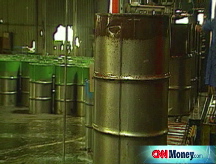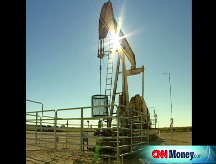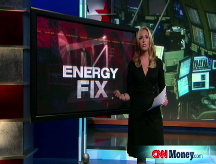Oil tumbles $4 on slumping demand
Inventory report shows higher-than-expected stockpiles of crude and gasoline, as demand for oil products slumps. Bearish Fed Beige Book worries traders that demand destruction will continue.

NEW YORK (CNNMoney.com) -- Oil prices continued to decline Wednesday, after a government report showed stronger-than-expected inventories and a Federal Reserve report showed a weakening economy.
Light, sweet crude for September delivery fell $3.98 to settle at $124.44 a barrel on the New York Mercantile Exchange.
Oil has tumbled nearly $23 since setting a record of $147.27 just eight trading days ago on July 11. Prices have not been this low since June 4.
The September futures contract became the so-called front-month contract as the August contract, which fell $3.09 to settle at $127.95 a barrel in the previous session, expired Tuesday. Oil settled down $3.51 from Tuesday's front-month settle. Oil futures contracts typically expire with seven trading days left in the month.
Inventory report: In its weekly inventory report, the U.S. Energy Information Administration, a government agency, said crude stocks fell by 1.6 million barrels last week. Analysts were looking for a drop of 1.9 million barrels, according to a consensus estimate of oil analysts compiled by Platts.
Though crude supplies fell, stockpiles of petroleum-based products rose much more than expected. That sent the price of oil sinking on expectations of weakening demand.
Distillates, used to make heating oil and diesel fuel, rose by 2.4 million barrels while gasoline supplies rose by 2.9 million barrels. Analysts were looking for a 2.2 million barrel rise in distillates supplies and a 500,000 barrel rise in gasoline stockpiles.
"On the product side, demand is bad," said Phil Flynn, a senior market analyst at Alaron Trading. "In terms of gasoline supplies, we have to find someone around here who wants to drive a car, because we don't have a place to put it all."
Gasoline stockpiles increased, even as refineries operated at 87.1% of their operable capacity last week, down from 89.5% the prior week.
That's because demand for gasoline in the United States has fallen 2.4% from the same period last year, according to the EIA report. In a weekly pump spending survey conducted by MasterCard, demand for gas in the United States fell last week for the 13th week in a row.
Economy: The U.S. economy continues to be mired in a slump, according to the Beige Book economic status report released by the Federal Reserve on Wednesday. The Fed said consumer spending remains sluggish, and home prices continue to decline.
"People had a pretty good return in terms of investment activity, but with growing uncertainty about the global financial climate, it's not surprising that people would want to take some risk off the market," said Kevin Norrish, a commodities analyst with Barclays Capital in London. "The fundamentals haven't changed, but oil probably rose too high too fast."
High oil prices have pinched the pockets of American consumers, who have altered their habits to decrease the amount of fuel they use.
"There are some very serious challenges facing the U.S. economy, said Rachel Ziemba, an oil analyst with RGE Monitor. "The problems are not going to go away, so looking forward, traders see that demand for oil and oil products is probably going to be slower in second half of year."
Gulf storm: Contributing to the oil decline were the easing of fears that Hurricane Dolly would interfere with drilling off the shore of the Gulf Coast.
The average hurricane halts oil drilling production for over a week, according to the American Petroleum Institute. Rig workers are forced to evacuate two to three days before the storm hits, and as soon as it's safe to return, they have to check for damage before they can restart production.
Investors had priced in such a supply disruption to Gulf Coast refineries, but as it became apparent that Dolly's path would not damage or disrupt many offshore rigs, traders sold off.
Crackdown on speculation: Legislation meant to crack down on oil speculators passed a key test vote in the Senate on Tuesday. The vote on the legislation, which was backed by the Democratic leadership, was 94-0. The support of 60 senators was needed for debate on the bill to proceed, but it was unclear when a final vote on the legislation would occur.
"There's a lot of uncertainty surrounding the legislation in the U.S.," said Norrish. "Obviously, the vote is just to consider the bill, but people are uncertain about what that will mean for oil prices."
Nigerian threats: Nigeria's main militant group is threatening to destroy the country's major oil pipelines within 30 days, the Associated Press reported Wednesday. The threat is aimed at countering allegations that militants are being paid by the nation's state-run oil company to protect oil facilities.
The news did not have a large effect on prices.
Gas prices fall again: The price of a gallon of regular unleaded gasoline fell to $4.042 Wednesday, down from $4.055 the previous day, according to a daily survey from motorist advocacy group AAA. It was the 6th straight decline for gas prices. ![]()






